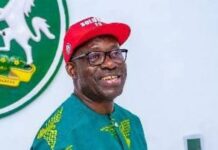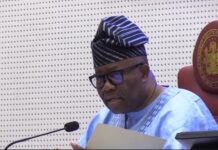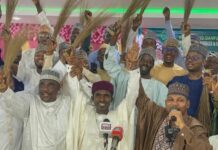Peter Obi was born on 19 July 1961 in Onitsha. He was a two-term governor of Anambra State under the platform of the All Progressives Grand Alliance APGA. Obi served as governor from 17 March 2006 to May 2007 when he was impeached by a PDP dominated house of assembly on frivolous charges. The court overturned the impeachment and he returned to office on 14 June 2007 and served out his four years term. He was re-elected for second term in February 2010.
Obi studied Philosophy at the University of Nigeria, Nsukka. He has attended world-class universities like Harvard, Columbia, Oxford and London School of economics and Kellogg School of Management for executive programmes and management courses.
In 2019, Obi was the running mate of Alhaji Atiku Abubakar in what was a desperate attempt by Nigeria’s main opposition party, the Peoples Democratic Party to unseat the incumbent, President Mohammadu Buhari accused of almost running the country aground. That spirited effort failed. Obi returned to campaign trail in 2022, this time around not to be a running mate to anybody but to be the main flag bearer of the PDP.
Obi promises to take the country from consumption to production. After resigning from the Peoples Democratic Party, he joins the Labour Party to pursue his presidential ambition. He says it’s a struggle to rescue and take back Nigeria from poor administrators. Is Nigeria about to witness a Democratic Revolution?
Obification of Nigerian Politics
The digital age is changing everything including politics. Social contract is being redefined and enforced by a mass of citizens exposed to overload of information and using social media platforms to make their voices heard. Old authorities including political leaders and traditional media are being bypassed by reformative movements. Populist actions are challenging the authority of the status quo in new ways. In Nigeria of the moment, this mass movement is symbolized by Peter Obi. If well nurtured, it’s a tide capable of sweeping aside the entrenched vestiges of transactional and patronage politics, and install a horizon of hope. It is the “Obification” of Nigerian politics, a continuation of EndSARS.
What Does Obification Portend for Nigeria in Real Terms?
- Some say to thunder is not to rain. Does it apply to the Obi Fever?
- Is this thundering leading to a heavy rain?
- Does it have a tinge of a revolutionary movement?
- Is it the beginning of a revolution that transcends the 2023 election?
- Can it be sustained or it will be aborted by a counter force – remember the ‘Lekki Massacre’?
- What are traditional politicians planning in the face of the aggression and overwhelming number of “Obicians”?
- Is something about to give in in Nigeria?
Challenges Facing the Obification of Nigeria
These challenges include but not limited to:
- Does Obi’s party, the Labour Party, have the spread to crown him president?
- How does he intend to penetrate the traditional and rural frontiers in the northern parts of Nigeria?
- For a party not fielding popular candidates in states and federal constituencies, what gives Obicians hope that Obi is the man?
- In fact as it stands now, Obi is the only popular candidate of his party. There are no popular senatorial and gubernatorial candidates on the platform of Labour Party. Or will NLC and TUC use their spread in every parts of Nigeria to back their candidate?
- Where are Obicians getting their guts from despite Tinubu and Atiku being heavily invested in this race?
- Does the Social Media popularity win election?
- Yes Obi is loved but does love win election in Nigeria?
No matter how you want to look at it, the “Obification” process is speedily and aggressively unraveling on social media and it is gradually making a land fall in forms of carnivals and processions. If it is further energized beyond its elastic limit, it will land with a ferocious force capable of anything. This itself can be destabilizing or transformative. What do you think?





